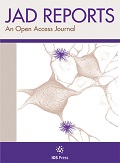Authors: Sobregrau, Pau | Peri, Josep M. | Sánchez del Valle, Raquel | Molinuevo, Jose L. | Barra, Bernardo | Pintor, Luís
Article Type:
Research Article
Abstract:
Background: Predictive genetic tests are presently effective over several medical conditions, increasing the demand among patients and healthy individuals. Considering the psychological burden suspected familial dementia may carry on individuals, assessing personality, coping strategies, and mental health could aid clinicians in findings the appropriate time for delivering genetic test results and predict compliance regarding genetic counseling and expectations towards the genetic condition depending on the outcome. Objective: To describe the psychiatric, psychological, and coping characteristics of a sample of Spanish individuals at risk of familial dementia before genetic test results were given. Methods: We included 54
…first degree relatives of patients diagnosed with Alzheimer’s disease, lobar frontotemporal degeneration, or prion diseases. The NEO-FFI-R, COPE, and HADS tests evaluated personality, coping strategies, and psychological distress, respectively. Results: Anxiety and depression were below the cut-off point for mild severity. Conscientiousness and Agreeableness were the most preponderant personality factors, while Neuroticism was the least. Positive reinterpretation and Acceptance were the most frequent coping strategies, and Denial and Alcohol and drug use were the least used. Ongoing medical pathologies increased depression, while psychiatric disorders worsened psychological distress. Conclusion: Contrary to our expectations, PICOGEN candidates showed psychological distress and personality traits within normative ranges, and the use of problem-focused coping strategies prevailed over avoidance coping strategies. Nevertheless, clinicians should pay particular attention to individuals attending genetic counseling who are women, aged, and present an ongoing psychiatric disorder and psychiatric history at inclusion to ensure their mental health and adherence throughout the process.
Show more
Keywords: Alzheimer’s disease, dementia, frontotemporal lobar degeneration, genetic counseling, genetic testing, neurodegenerative diseases,, prion diseases, psychiatry, psychology
DOI: 10.3233/ADR-210067
Citation: Journal of Alzheimer's Disease Reports,
vol. 6, no. 1, pp. 461-478, 2022





